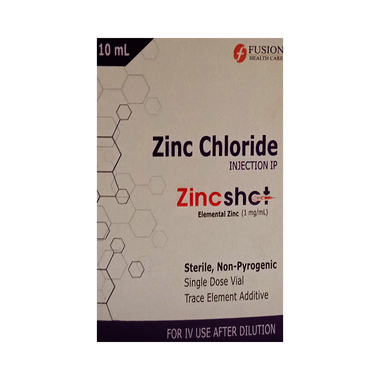No Related Products!
There is no related products found.
All Details About Zincshot Injection
Find out detailed description, uses, directions of use, side effects, warnings and precautions, frequently asked questions about Zincshot Injection
Description:
Zincshot Injection is a nutritional supplement prescribed to treat zinc deficiency in the body. It ensures the proper growth and functioning of the body and strengthens immunity. It also acts as an antioxidant and protects the cells from oxidative stress.Zincshot Injection is used as health supplement
Uses:
- Treatment of Zinc deficiency
Directions For Use:
Your doctor or nurse will give you this medicine. Compassionately do not self administer.Side Effects:
Most side effects do not require any medical attention and disappear as your body adjusts to the medicine. Consult your doctor if they persist or if you’re worried about themOrdinary side effects of Zincshot
- Limited data available
Warning & Precautions:
FAQs:
What is Zincshot Injection used for?
Who needs Zincshot Injection supplementation?
What precautions should be taken with Zincshot Injection?
Can Zincshot Injection cause serious side effects or toxicity?
Why does Zincshot Injection need to be diluted before use?
Can Zincshot Injection affect copper levels in the body?
What signs might indicate zinc overdose from Zincshot Injection?
Written by:
Dr. T. Sharmila Krishna
M.B.B.S., MD (Biochemistry)
Reviewed by:
Dr. Sureshbabu Yadav
M.B.B.S., DIP.DIAB, F.R.S.H
Disclaimer:
Getomeds primary intention is to ensure that its consumers get information that is reviewed by experts, accurate, and trustworthy. The information and contents of this website are for informational purposes only. They are not intended to be a substitute for professional medical advice, diagnosis, or treatment. Please seek the advice of your doctor and discuss all of your concerns about any disease or medication. Do not disregard or postpone seeking professional medical advice because of something you read on Getomeds. Our mission is to support, not replace, the doctor-patient relationship.
